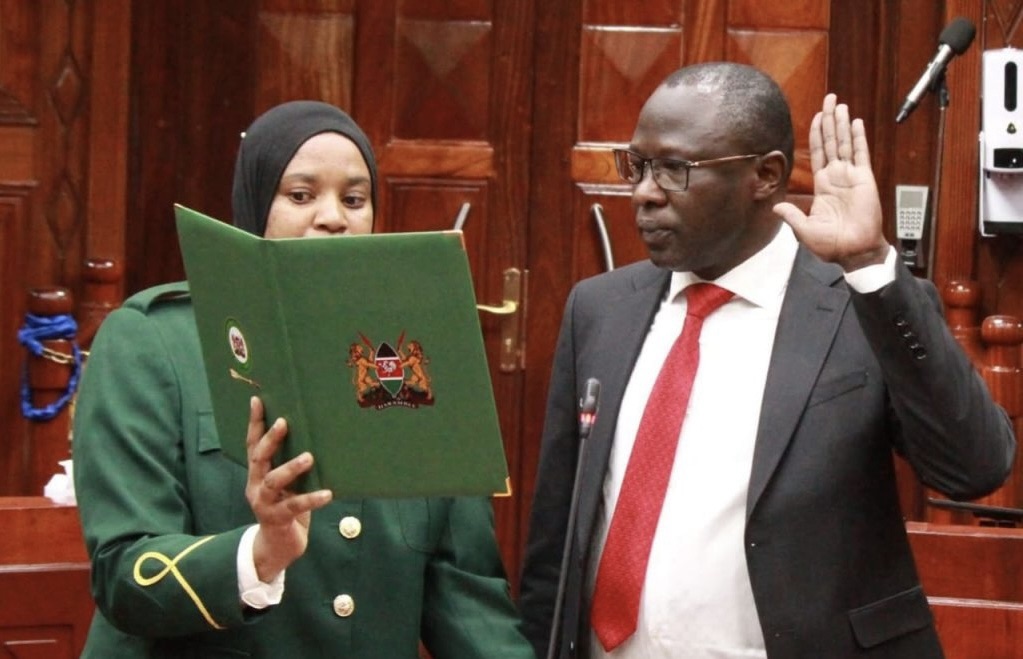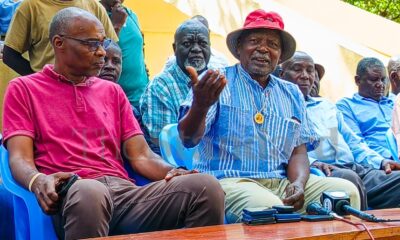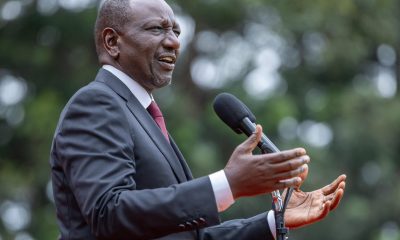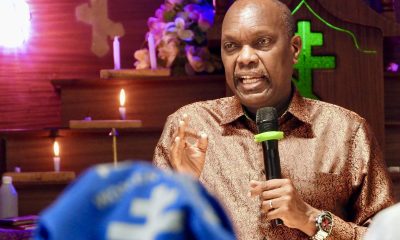Politics
President Ruto Officially Appoints Erastus Edung as IEBC Chair and Six New Commissioners Despite Court Order
The gazettement comes just six days after the National Assembly unanimously approved the nominations on Wednesday, June 4, 2025, following a recommendation from the Justice and Legal Affairs Committee (JLAC).

President William Ruto has officially appointed Erastus Edung Ethekon as the new chairperson of the Independent Electoral and Boundaries Commission (IEBC), alongside six commissioners, despite a subsisting High Court order temporarily barring their gazettement pending the determination of a constitutional petition challenging the appointment process.
The appointments, formalized through Gazette Notice No. 7724 and published in a special issue of the Kenya Gazette on Tuesday evening, invoke the powers conferred upon the Head of State under Article 250(2) of the Constitution of Kenya. Ethekon will serve a six-year term during which the IEBC is expected to restore public confidence in Kenya’s electoral processes.
The controversial move has raised significant concerns about the rule of law and judicial authority, as it directly contravenes a court directive that was meant to preserve the status quo until ongoing legal challenges are resolved.
Court Order Defied
The appointments were made despite a decision by a three-judge bench of the High Court that sustained an order blocking the gazettement of the IEBC nominees. Justices Roselyne Aburili, Bahati Mwamuye, and John Chigiti on Monday upheld an earlier directive by Justice Lawrence Mugambi, who had temporarily halted the gazettement pending the hearing of a constitutional petition.
The court ruled that the status quo should be maintained, with all parties scheduled to appear on June 23, 2025, for the substantive hearing. The judges directed all parties to file their written submissions and replying affidavits in preparation for the case.
Legal Challenge by Activists
The constitutional petition was filed by prominent activists Boniface Mwangi and Kelvin Roy, who are represented by senior counsels Paul Muite and Douglas Otieno.
The petitioners argue that the selection process lacked adequate public participation and violated constitutional standards for the appointment of IEBC commissioners.
Justice Mugambi, upon reviewing the petition, determined that the issues raised were significant enough to warrant determination by a full bench, prompting the referral to Chief Justice Martha Koome for empanelment.
Swift Action Following Parliamentary Approval
The gazettement comes just six days after the National Assembly unanimously approved the nominations on Wednesday, June 4, 2025, following a recommendation from the Justice and Legal Affairs Committee (JLAC).
The parliamentary committee had conducted thorough vetting of the nominees and submitted their report on Tuesday, June 3, 2025.
“Taking into consideration the findings of the departmental committee for Justice and Legal Affairs in its report on the vetting of the nominees for appointment as chairperson and members of the IEBC, the National Assembly approves the appointment,” National Assembly Speaker Moses Wetang’ula stated during the session.
New IEBC Leadership Team
In a concurrent gazette notice (No. 7725), President Ruto also appointed six commissioners who will serve alongside Ethekon for the same six-year term:
- Ann Njeri Nderitu (Nyandarua County)
- Moses Kipkogey Mukhwana (Kakamega County)
- Mary Karen Sorobit (Uasin Gishu County)
- Hassan Noor Hassan (Mandera County)
- Francis Odhiambo Aduol (Migori County)
- Fahima Araphat Abdallah (Mombasa County)
The appointments reflect Kenya’s regional diversity and gender balance, with three women and four men comprising the new seven-member commission.
Background to the Crisis
The IEBC has operated without commissioners since 2023 following the expiry of contracts for the remaining commissioners, Boya Molu and Abdi Guliye, alongside the tenure of the late chairperson Wafula Chebukati, who died in February 2025.
The commission’s troubles began after the contentious 2022 presidential election, when four commissioners—Juliana Cherera, Francis Wanderi, Justus Nyang’aya, and Irene Masit—either resigned or were removed from office amid disputes over the election results and internal governance issues.
Long Road to Reconstitution
The process to reconstitute the commission began on March 1, 2023, but faced significant delays spanning nearly two years. The recruitment process was revived on January 27, 2025, when President Ruto appointed a new seven-member selection panel to oversee the process.
The 48-year-old Turkana County-born lawyer Ethekon emerged as the preferred candidate after the selection panel recommended two nominees for the chairperson position and nine candidates for the six commissioner slots. Other contenders for the top position included former Judiciary registrar Anne Amadi and former East African Court of Justice judge Charles Nyachae.
Timing and Electoral Implications
The appointments come at a crucial time, with Kenya’s next general elections scheduled for 2027. The new commission will have approximately two years to prepare for what is expected to be a highly competitive electoral contest, including implementing technological improvements and addressing public concerns about electoral integrity.
The reconstitution also ends a period of institutional uncertainty that had raised questions about Kenya’s ability to conduct credible elections and maintain its democratic credentials in the region.
Constitutional and Political Implications
The decision to proceed with gazettement in the face of a court order has drawn sharp criticism from civil society groups and some opposition leaders, who argue that it undermines judicial authority and threatens the rule of law. Critics contend that the executive’s actions set a dangerous precedent for disregarding court directives.
However, the government maintains that the appointments followed due process and are necessary to ensure the IEBC is fully reconstituted ahead of the 2027 General Election. Officials argue that the commission cannot remain headless indefinitely, especially with crucial electoral preparations required.
Uncertain Future
As the legal battle unfolds, the fate of the newly appointed commissioners remains uncertain. The upcoming court session on June 23, 2025, will be pivotal in determining whether the appointments stand or if the entire process must be revisited. The petitioners are seeking to have the selection process declared unconstitutional and null and void.
Looking Ahead
With the formal appointments now in place, the new IEBC leadership faces the immediate task of rebuilding public trust in the electoral system. The commission will need to address concerns about transparency, operational independence, and the use of technology in elections—issues that have dominated public discourse since the disputed 2022 polls.
The appointments have been generally welcomed by various stakeholders, though some opposition figures, including Wiper Party leader Kalonzo Musyoka, have expressed reservations about the nomination process.
As Kenya moves toward the 2027 elections, all eyes will be on the new IEBC leadership to demonstrate their commitment to free, fair, and credible electoral processes that can restore confidence in the country’s democratic institutions.
The new commissioners are expected to be sworn in soon and begin their work of preparing for upcoming by-elections and the 2027 general elections.
Kenya Insights allows guest blogging, if you want to be published on Kenya’s most authoritative and accurate blog, have an expose, news TIPS, story angles, human interest stories, drop us an email on [email protected] or via Telegram
-

 Business2 weeks ago
Business2 weeks agobetPawa Empire Crumbles: Mr Eazi’s Betting Gambit Unravels Amid Partner’s Shadowy Deals
-

 Business1 week ago
Business1 week agoMinnesota Fraud, Rice Saga, Medical Equipment Deal: Why BBS Mall Owner Abdiweli Hassan is Becoming The Face of Controversial Somali Businessman in Nairobi
-

 News1 week ago
News1 week agoDCI Probes Meridian Equator Hospital After Botched Procedure That Killed a Lawyer
-

 Politics1 week ago
Politics1 week agoYour Excellency! How Ida’s New Job Title From Ruto’s Envoy Job Is Likely to Impact Luo Politics Post Raila
-

 Investigations2 weeks ago
Investigations2 weeks agoEXPOSED: SHA Officials Approve Higher Payments for Family, Friends as Poor Patients Pay Out of Pocket
-

 News1 week ago
News1 week agoKenya Stares At Health Catastrophe As US Abandons WHO, Threatens Billions In Disease Fighting Programmes
-

 Business2 weeks ago
Business2 weeks agoKRA Boss Humphrey Watanga In Big Trouble In Sh5.5 Billion Rice Import Scandal
-

 Politics1 week ago
Politics1 week agoJaramogi Clan Tells Raila Jr, Winnie Against Disrespecting Their Uncle Oburu, Warns of Curses





























